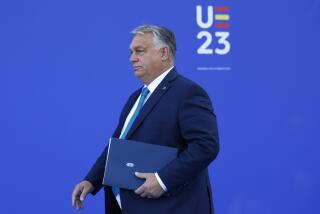Bulgarians Celebrate Freedom of Speech
- Share via
SOFIA, Bulgaria — Bulgarians celebrated their newly revived freedom of speech Sunday by gathering in parks to discuss political ideas, including the creation of opposition parties to challenge the ruling Communist regime.
Meanwhile, a popular discussion program returned to national television Sunday night, presenting a series of provocative interviews sometimes critical of the government.
The program, “Every Sunday,” was banned last summer by the regime of deposed leader Todor Zhivkov, after it broadcast a statement by a Soviet author challenging the idea of world proletarian revolution.
After one of the most intense weeks in the history of this mountainous, long-repressed land on the Balkan Peninsula, citizens in the capital had a chance Sunday to flex their new freedoms and return to more normal routines.
At Juzen Park, on the south side of the city in the shadow of snow-capped Mt. Vitosha, several hundred people gathered under stands of birch trees. In various states of agitation and passion, they discussed the remarkable political changes that have taken place here since Zhivkov was forced to resign Nov. 10 and was replaced as general secretary of the Bulgarian Communist Party by Foreign Minister Petar Mladenov.
Mladenov consolidated his position last week by expelling three Zhivkov cronies from the party ruling council, the Politburo. He demonstrated new tolerance toward popular movements by allowing two large political rallies Friday and Saturday that both contained large doses of political dissent.
In the bright sunlight Sunday afternoon, the clumps of orators and political polemicists were more evocative of London’s Hyde Park or Berkeley’s Sproul Plaza than they were of the sullen, silent, secret society that existed under most of Zhivkov’s 35-year reign. A woman, asked by a roving television reporter what she thought were the worst aspects of the Zhivkov regime, responded: “The silence. The silence.”
Dr. Emil Katherinoff, 67, a radiologist in a Sofia hospital, used the park setting to propose the return of the independent Bulgarian Socialist Party that disappeared from public life here more than four decades ago.
“We are proposing a return of the Socialist Party,” said Katherinoff, who managed to attract half a dozen listeners to his discussion. “I have been waiting for this moment nearly all my life.” What he had in mind, he said, was something like the democratic socialist parties found in France and other Western European countries.
Other discussion groups featured lively debates on the independent labor movement, Podkrepa (Support), modeled on the Polish Solidarity movement, ecological issues and the troubling national debate over the estimated 1 million Turkish-speaking Bulgarian Muslims who were persecuted and forced to adopt orthodox Christian names under the Zhivkov regime.
So far, Mladenov has given no indication of his position on the touchy issue of the ethnic Turks, considered one of the main impediments in Bulgaria’s efforts to forge a democratic society.
On the television program “Every Sunday,” host Kevork Kevorkian celebrated the show’s return by interviewing a series of political and artistic figures about the recent changes here.
“What happened in this country was like a bleeding wound,” said popular writer and poet Blaga Dimitrova, some of whose works were banned under the Zhivkov reign. “The most tragic situation was that people saw things going on around them, but could not raise their voices. Such a society was doomed to apathy.”
But reflecting the overriding caution among intellectuals that still marks Bulgarian society, she warned her compatriots to avoid overreacting to the new freedoms in a way that might provoke massive state retaliation and a return to repression.
“We are swimming at a dangerous depth that may produce wild jubilation,” Dimitrova said, “but we must maintain a sense of reality.”
Kevorkian also interviewed Bulgarian playwright Stefan Tzanev and showed a scene from his new play, “The Terrible Trial.” The play features a character modeled on former Bulgarian Communist Traicho Kostov, who was executed in 1949 after a trial accusing him of conspiring with neighboring Yugoslavia.
More to Read
Sign up for Essential California
The most important California stories and recommendations in your inbox every morning.
You may occasionally receive promotional content from the Los Angeles Times.










